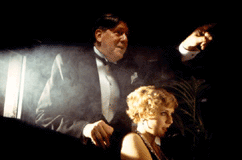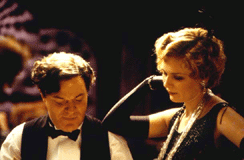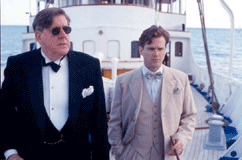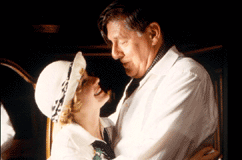The Cat’s Meow (Peter
Bogdanovich) 2002
 Since Peter Bogdanovich has always taken it upon himself to
be a gatekeeper of sorts to bygone Hollywood, his attraction to the events in The
Cat’s Meow isn’t especially surprising. The infamous boat ride that the
film obsesses about allows him the chance to place many of Old Hollywood’s
elite in compromising positions. Its portrayal of William Randolph Hearst,
who’s more popularly known as Citizen Kane these days, as a man more
worried about the column space devoted to an illicit affair than the tryst
itself would have made Orson Welles, Bogdanovich’s mentor of sorts, proud. The
director’s inability to make us feel that these events say something larger
about society and the glaring tonal inconsistencies that eventually cause this ship to
sink are a bit more surprising, however.
Since Peter Bogdanovich has always taken it upon himself to
be a gatekeeper of sorts to bygone Hollywood, his attraction to the events in The
Cat’s Meow isn’t especially surprising. The infamous boat ride that the
film obsesses about allows him the chance to place many of Old Hollywood’s
elite in compromising positions. Its portrayal of William Randolph Hearst,
who’s more popularly known as Citizen Kane these days, as a man more
worried about the column space devoted to an illicit affair than the tryst
itself would have made Orson Welles, Bogdanovich’s mentor of sorts, proud. The
director’s inability to make us feel that these events say something larger
about society and the glaring tonal inconsistencies that eventually cause this ship to
sink are a bit more surprising, however.
 Although the atmosphere that the director sometimes manages
to hint that wilder antics are going on behind closed doors, one can’t help
but feel that things have been reigned in here to create an air of
respectability. Bogdanovich seems at once in awe of his subjects’ class and
convinced that he’s showing us a modern Babylon. Any attempts to attain some
sort of legitimacy fails here though, since we’re cursed with the knowledge
that everything on screen is informed most by speculation and probably a good
deal of wishful thinking. Everything that we see has been fabricated, as the
narration tells us this more than once, and just in case, we’re still
believers, a disclaimer reassures us that the film’s characters are fictional,
making the experience roughly akin to a trip to David Lynch’s Club Silencio
where the audience is repeatedly told that everything they see phony and then
expected to lap it up emotionally.
Although the atmosphere that the director sometimes manages
to hint that wilder antics are going on behind closed doors, one can’t help
but feel that things have been reigned in here to create an air of
respectability. Bogdanovich seems at once in awe of his subjects’ class and
convinced that he’s showing us a modern Babylon. Any attempts to attain some
sort of legitimacy fails here though, since we’re cursed with the knowledge
that everything on screen is informed most by speculation and probably a good
deal of wishful thinking. Everything that we see has been fabricated, as the
narration tells us this more than once, and just in case, we’re still
believers, a disclaimer reassures us that the film’s characters are fictional,
making the experience roughly akin to a trip to David Lynch’s Club Silencio
where the audience is repeatedly told that everything they see phony and then
expected to lap it up emotionally.
 Since we can’t trust what we see, it’s hard to look at
the The Cat Meow’s portrayal of its characters as anything other than
caricature. Still, the implication that Thomas Ince was a mini-Iago seems
somewhat slanderous. Kirsten Dunst’s portrayal of Marion Davies seems to have
been conceived with more heart than Welles ever allowed her doppelganger in Kane
to have (sorry, no references to her “rosebud” here), but her character
lacks the complexity to make her truly compelling. We’re unsure that there’s
ever anything ticking in her head at all. Likewise, Jennifer Tilly’s Louella
Parsons is painted both as a half-wit and a schemer, but the two feel mutually
exclusive, to the film’s detriment. Ironically, the character that feels most
fleshed out is Hearst (Edward Herrmann). At least his rage and paranoia don’t
feel compromised by a cartoonish portrayal. Though he seems tremendously
vulnerable early on, once we see him spinning the events that occurred on the
boat, we can finally understand a little about the man’s power.
Since we can’t trust what we see, it’s hard to look at
the The Cat Meow’s portrayal of its characters as anything other than
caricature. Still, the implication that Thomas Ince was a mini-Iago seems
somewhat slanderous. Kirsten Dunst’s portrayal of Marion Davies seems to have
been conceived with more heart than Welles ever allowed her doppelganger in Kane
to have (sorry, no references to her “rosebud” here), but her character
lacks the complexity to make her truly compelling. We’re unsure that there’s
ever anything ticking in her head at all. Likewise, Jennifer Tilly’s Louella
Parsons is painted both as a half-wit and a schemer, but the two feel mutually
exclusive, to the film’s detriment. Ironically, the character that feels most
fleshed out is Hearst (Edward Herrmann). At least his rage and paranoia don’t
feel compromised by a cartoonish portrayal. Though he seems tremendously
vulnerable early on, once we see him spinning the events that occurred on the
boat, we can finally understand a little about the man’s power.
 The performances that Bogdanovich coaxes out his actors are all interesting, but
they each seem to exist in a vacuum, bearing little relationship to each other.
The resultant clash in acting styles undermines many of the movie’s dramatic
moments, since one character’s droll mannerisms hint at another’s ennui.
Tilly and Joanna Lumley turn in the sort of mannered performances that can spark
up a film that’s been more capably directed (witness Maggie Smith’s scenery
chewing in Gosford Park), but here they distract from the movie’s more
serious heart. The witty retorts that start the film off with a fair degree of
energy only take things so far, and eventually, they begin to feel entirely
detrimental. The problem seems to lie in Bogdanovich’s desire to paint the
cruise as an example of Hollywood’s decay á la Sunset Blvd. Most of
the decay seems to have taken place in Bogdanovich’s directing skills, however
(it’s been nearly a decade since his last feature), and the closing
monologue’s attempts to paint the Hollywood game as a massive farce feel
forced at best. Still, just as Hearst’s life seems to be defined more by
Welles’ film than by the facts themselves, The Cat’s Meow, which is
narrated by a gossip columnist, demonstrates the way that hearsay can segue
quietly into fact.
The performances that Bogdanovich coaxes out his actors are all interesting, but
they each seem to exist in a vacuum, bearing little relationship to each other.
The resultant clash in acting styles undermines many of the movie’s dramatic
moments, since one character’s droll mannerisms hint at another’s ennui.
Tilly and Joanna Lumley turn in the sort of mannered performances that can spark
up a film that’s been more capably directed (witness Maggie Smith’s scenery
chewing in Gosford Park), but here they distract from the movie’s more
serious heart. The witty retorts that start the film off with a fair degree of
energy only take things so far, and eventually, they begin to feel entirely
detrimental. The problem seems to lie in Bogdanovich’s desire to paint the
cruise as an example of Hollywood’s decay á la Sunset Blvd. Most of
the decay seems to have taken place in Bogdanovich’s directing skills, however
(it’s been nearly a decade since his last feature), and the closing
monologue’s attempts to paint the Hollywood game as a massive farce feel
forced at best. Still, just as Hearst’s life seems to be defined more by
Welles’ film than by the facts themselves, The Cat’s Meow, which is
narrated by a gossip columnist, demonstrates the way that hearsay can segue
quietly into fact.
* * 1/2
4-15-02
Jeremy Heilman